Saturday, February 09, 2008
Saturday After Ash Wednesday
Station Church:
S. Agostino in Campo Marzio\

Devotions for a Lenten Saturday:
Divine Mercy Chaplet
Seven Penitential Psalms
Prayer of St. Thomas More
Threnus Prayer
Stabat Mater Dolorosa
Litany of Our Lady of Sorrows
Sorrowful Mysteries
S. Agostino in Campo Marzio\

Devotions for a Lenten Saturday:
Divine Mercy Chaplet
Seven Penitential Psalms
Prayer of St. Thomas More
Threnus Prayer
Stabat Mater Dolorosa
Litany of Our Lady of Sorrows
Sorrowful Mysteries
Labels: Restorationists
Our Blessed Lady's Saturday

The Pieta Novena Prayer
"It has long been a custom in the Church to say this prayer of petition on 30 consecutive days. It is also recommended as a Lenten devotion as well as for all Fridays of the year." from Catholic Tradition
Ever glorious and blessed Mary, Queen of Virgins, Mother of Mercy, through that sword of sorrow which pierced thy tender heart whilst thy only Son, Jesus Christ, our Lord, suffered death and ignominy on the Cross; through that filial tenderness and pure love He hast for thee, while from His Cross He recommended thee to the care and protection of His beloved disciple, Saint John, take pity, I beseech thee, on my poverty and need; have compassion on my anxieties and cares; assist and comfort me in all my infirmities and miseries. Thou art the Mother of Mercies, the only refuge of the needy and the orphan, of the desolate and afflicted.
Cast therefore an eye of pity on this sorrowful child of Eve, and hear my prayer; for since, in just punishment of my sins, I find myself surrounded by a multitude of evils, and oppressed with much anguish of spirit, where can I fly for more secure shelter, O loving Mother of my Lord and Savior Jesus Christ, than under the wings of thy maternal protection? Listen, therefore, I beseech thee, with an air of pity and compassion, to my humble and earnest request.
I ask it through the infinite mercy of thy dear Son: through that love and humility with which He embraced our human nature, when through thine own obedience to the Divine Will, thou didst consent to become His Mother, and Whom after nine months, you didst bring forth from thy chaste womb, to visit this world, and bless it with His presence. I ask it, through the anguish of mind of thy beloved Son, our dear Savior, on Mount Olivet, when He besought His Eternal Father, to remove from Him, if possible, the bitter chalice of His future passion. I ask it, through the three-fold repetition of His prayers in the Garden, from whence afterwards in sorrow thou didst accompany Him to the scene of His death and sufferings.
In ask it, through the laceration of His sinless flesh, caused by the cords and whips with which He was bound and scourged, when stripped of His seamless garments, for which His executioners afterwards cast lots. I ask it, through the scoffs and ignominies by which He was insulted; the false accusations and unjust sentence by which He was condemned to death, and which He bore with enduring patience. I ask it, through His bitter tears and bloody sweat; His silence and resignation; His sadness and grief of heart.
I ask it, through the Blood which trickled from His royal and Sacred Head, when struck with the scepter of a reed, and pierced with His Crown of Thorns. I ask it, through the excruciating torments He suffered, when His hands and feet were fastened with nails to the tree of the Cross. I ask it, through His unbearable thirst, and bitter potion of vinegar and gall. I ask it, through His dereliction on the Cross, when He exclaimed: My God, My God, why hast Thou forsaken me? I ask it, through His Mercy extended to the good thief, and through His recommending His precious Soul and spirit into the hands of His Eternal Father, before He expired, saying: "It is finished." I ask it, through the Blood mixed with water, which issued from His Sacred Side when pierced with a lance from whence a flood of grace and mercy has flowed to us.
I ask it, through His immaculate life, bitter passion and ignominious death on the Cross, at which even nature itself was thrown into convulsions by the bursting of rocks, rending of the veil of the temple, the earthquake and darkness, of the sun and the moon. I ask it, through His glorious victory over death, when He arose again to life on the Third day, and through the joy which His appearance for forty days, gaveth thee, His Blessed Mother, His Apostles, and the rest of His disciples; when in thy and their presence, He miraculously ascended into Heaven.
I ask it, through the grace of the Holy Spirit, infused into the hearts of His disciples; when He descended upon them in the form of fiery tongues, and by which they were inspired with zeal for the conversion of the world, when they went to preach the Gospel. I ask it, through the glorious appearance of thy Son, at the last day, when He shall come to judge the living and the dead, and the world by fire. I ask it, through the compassion He bore in this life, and the wonderful joy thou didst feel at thine Assumption into Heaven, where thou doth eternally contemplate His Divine perfection.
O glorious and ever Blessed Virgin, comfort the heart of thy suppliant, by obtaining for me . . .
Here mention or reflect on your request.
And as I believe that my Divine Savior honors thee as His beloved Mother, to whom He refuses nothing contrary to His honor, so let me soon experience thy powerful intercession. Wherefore, O most Blessed Virgin, beside my present petition, and whatever else I may stand in need of, obtain for me also of thy dear Son, our Lord and our God, a lively faith, firm hope, perfect charity, true contrition of heart and genuine tears of compunction, sincere confession, satisfaction and deliverance from sin, love of God and my neighbor, a correct attitude to the world, patience to suffer insults, even death itself, for love of thy Son, our Savior Jesus Christ. Obtain likewise for me, O Holy Mother of God, perseverance in good works, the carrying out of my good resolutions, mortification of my self-will, a holy life, and, at my last moments, a strong and sincere repentance, with such presence of mind, as will enable me to receive the last Sacrament of the Church worthily, so as to die in God's friendship and favor.
Lastly, I beseech thee, for the Souls of my parents, brethren, relatives and benefactors, both living and dead, life everlasting, from the only giver of every good and perfect gift, the Lord God Almighty: to Whom be all power, now and forever. Amen.
Labels: Restorationists
Friday, February 08, 2008
Friday At the Foot Of the Cross
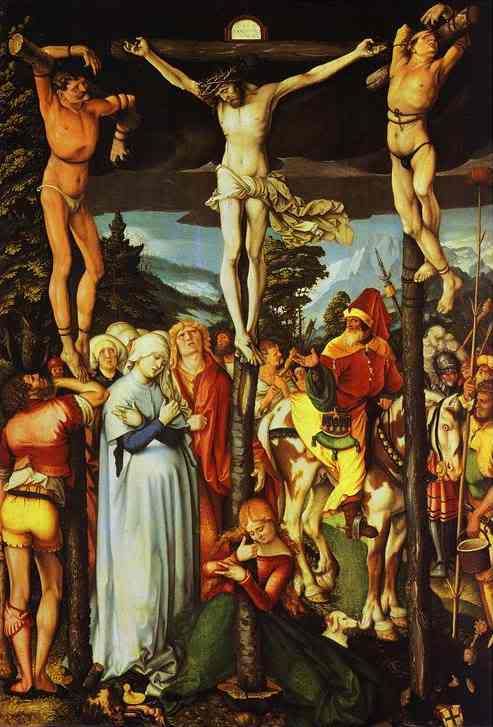
We begin on this Friday After Ash Wednesday a series of reflections and prayers from The Passion And Death of Jesus Christ, by Saint Alphonsus Liguori, on the Seven Last Words, which we will conclude on Good Friday.
"Father, forgive them, for they know not what they do." [Luke 23: 34]
O loving tenderness of Jesus towards men! Saint Augustine says that when the Savior was injured by His enemies, He besought pardon for them; for He thought not so much of the injuries He received from them, and the death they inflicted upon Him, as upon the love which brought Him to die for them.
But some may say, Why did Jesus pray to the Father to pardon them, when He Himself could have forgiven their injuries? St. Bernard replies that He prayed to the Father, not because He could not Himself forgive them, but that He might teach us to pray for them that persecute us. The holy abbot says also in another place: "O wonderful thing! He cries, Forgive; they cry, crucify." Arnold of Chartres remarks that while Jesus was laboring to save the Jews, they were laboring to destroy themselves; but the love of the Son had more power with God than the blindness of this ungrateful people. St. Cyprian writes, "Even he who sheds the Blood of Christ is made to live by the blood of Christ." Jesus Christ, ill dying, had so great a desire to save all men, that He made even those enemies who shed His Blood with torments partakers of that Blood." Look, says St. Augustine, at thy God upon His Cross; see how He prays for them that crucify Him; and then deny pardon to thy brother who has offended thee!
St. Leo writes that it was through this prayer of Christ that so many thousands of Jews were converted at the preaching of St. Paul, as we read in the Acts of the Apostles; whilst [says St. Jerome] God did not will that the prayer of Jesus Christ should continue without effect, and therefore at the very time he caused many of the Jews to embrace the faith. But why were they not all converted? I reply that the prayer of Jesus Christ was conditional, and that they who were converted were not of the number of those of whom it was said, Ye have resisted the Holy Ghost. [Acts 7: 51]
In this prayer Jesus Christ further included all sinners; so that we all may say to God:
O Eternal Father, hear the prayer of Thy beloved Son, Who prayed to Thee to pardon us. We deserve not this pardon, but Jesus Christ has merited it, Who by His death has more than abundantly satisfied for our sins. No, my God, I would not be obstinate like the Jews; I repent, O my Father, with all my heart, for having offended Thee, and through the merits of Jesus Christ I ask for pardon. And Thou, O my Jesus, Thou dost know that I am poor and sick, and lost through my sins; but Thou hast come from Heaven on purpose to heal the sick, and to save the lost, when they repent of having offended Thee. Of Thee Isaiah said, He came to save that which had perished. [Isaiah 61: 1] And of Thee St. Matthew writes, The Son of Man is come to save that which was lost. [Matthew 18: 11]
Labels: Restorationists
Friday After Ash Wednesday
Station Church:
Ss. Giovanni e Paolo al Celio

Devotions For a Lenten Friday Holy Hour:
Dies Irae
Divine Mercy Chaplet
Seven Penitential Psalms
Prayer of St. Thomas More
Threnus Prayer of Saint Augustine
Devotions To the Holy Cross
Stations of the Cross
My preferred method: The one from St. Alphonsus Liguori, as republished by TAN, with the illustrations from the Benzinger Brothers edition. Each year, as I go back to the Stations, I find new depths of imagery for our contemplation, and my appreciation for this edition deepens.
Here are some examples:
First Station
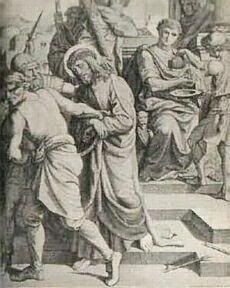
Note the Lictors with the Fasces behind Pilate, and the broken stick, indicating that a sentence of death has been passed.
Fourth Station
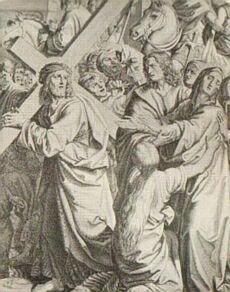
See the physical resemblance in the faces of Our Lord and Our Blessed Lady. See also the cruel inhumanity of the brute shoving the nails that will be driven into Our Lord's Body practically into Our Blessed Lady's face.
Seventh Station
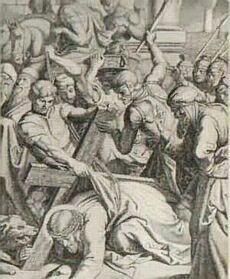
Bestial cruelty towards Our Lord from His captors and tormentors. See the wicked individual in the right foreground angrily upbraiding Our Saviour for His weakness. Even the dog is snarling at Him.
Eleventh Station
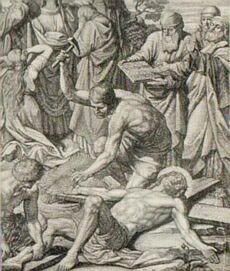
See the Sanhedrinal leaders clucking in the background over the sign Pilate has ordered. This particular rendition almost cuts it off, but we are again struck by the physical similarity between Our Lord and Our Blessed Lady, which is highlighted by Our Blessed Lady raising her hands in prayer, as Our Lord's arms are spread out on the Cross.
Twelfth Station
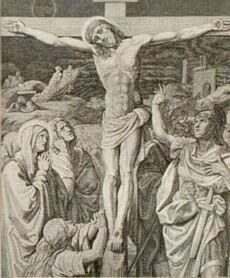
So many details here. We see the eclipse and the bodies of the righteous rising from their tombs. The prayerfulness of Our Blessed Lady, the contemplation of St. John, the extravagant grief of St. Mary Magdalene, as well as the recognition of the centurion.
Ss. Giovanni e Paolo al Celio

Devotions For a Lenten Friday Holy Hour:
Dies Irae
Divine Mercy Chaplet
Seven Penitential Psalms
Prayer of St. Thomas More
Threnus Prayer of Saint Augustine
Devotions To the Holy Cross
Stations of the Cross
My preferred method: The one from St. Alphonsus Liguori, as republished by TAN, with the illustrations from the Benzinger Brothers edition. Each year, as I go back to the Stations, I find new depths of imagery for our contemplation, and my appreciation for this edition deepens.
Here are some examples:
First Station

Note the Lictors with the Fasces behind Pilate, and the broken stick, indicating that a sentence of death has been passed.
Fourth Station

See the physical resemblance in the faces of Our Lord and Our Blessed Lady. See also the cruel inhumanity of the brute shoving the nails that will be driven into Our Lord's Body practically into Our Blessed Lady's face.
Seventh Station

Bestial cruelty towards Our Lord from His captors and tormentors. See the wicked individual in the right foreground angrily upbraiding Our Saviour for His weakness. Even the dog is snarling at Him.
Eleventh Station

See the Sanhedrinal leaders clucking in the background over the sign Pilate has ordered. This particular rendition almost cuts it off, but we are again struck by the physical similarity between Our Lord and Our Blessed Lady, which is highlighted by Our Blessed Lady raising her hands in prayer, as Our Lord's arms are spread out on the Cross.
Twelfth Station

So many details here. We see the eclipse and the bodies of the righteous rising from their tombs. The prayerfulness of Our Blessed Lady, the contemplation of St. John, the extravagant grief of St. Mary Magdalene, as well as the recognition of the centurion.
Labels: Restorationists
Feast Of the Crown Of Thorns

This Crown of Thorns is a reproduction based on the Wounds of Our Lord on the Holy Shroud of Turin.
This feast was removed from the calendar even before Vatican II, and the Catholic Encyclopedia says it was never adopted for the Universal Church. it had moved around a bit before settling on the Friday After Ash Wednesday.
O Sacred Head surrounded by crown of piercing thorn!
O bleeding Head so wounded, reviled and put to scorn!
Death's pallid hue comes o'er Thee, the glow of life decays,
Yet angel hosts adore Thee and tremble as they gaze.
I see thy strength and vigor all fading in the strife,
And death, with cruel rigor, bereaving Thee of life;
O agony and dying! O love to sinners free!
Jesus, all grace supplying, O turn Thy face on me.
In this, Thy bitter passion, Good Shephered think of me
With thy most sweet compassion, unworthy though I be;
Beneath Thy Cross abiding forever would I rest,
In Thy dear love confiding, and in Thy presence blest.
Labels: Restorationists
Thursday, February 07, 2008
From St. Franci de Sales' Sermon For Ash Wednesday
I am reading St. Francis de Sales' Sermons For Lent again this year, and was taken with his Ash Wednesday sermon and its call to make our fasting not just a deprivation of the mouth and the belly, but a deprivation of all the senses.
St. Francis spoke of the need to practice the discipline of the eyes, and the mind, and the tongue, and the ears more during this fast. Not engaging in frivolous discussions about the vainglorious things of this world. Keeping the eyes downcast lest we, by seeing the delights of this world, sin with our thoughts. Depriving the ears of pleasant tunes.
Also, he spoke at length of the need to make our fast private, and not advertise to all the world just how miserable we are (and that is something I need to work on). Although our fasting may edify others, we fast for ourselves, for our salvation, and in reparation for the insults to the Sacred Heart.
St. Francis spoke of the need to practice the discipline of the eyes, and the mind, and the tongue, and the ears more during this fast. Not engaging in frivolous discussions about the vainglorious things of this world. Keeping the eyes downcast lest we, by seeing the delights of this world, sin with our thoughts. Depriving the ears of pleasant tunes.
Also, he spoke at length of the need to make our fast private, and not advertise to all the world just how miserable we are (and that is something I need to work on). Although our fasting may edify others, we fast for ourselves, for our salvation, and in reparation for the insults to the Sacred Heart.
Labels: Restorationists
Thursday After Ash Wednesday
Station Church: S. Giorgio al Velabro
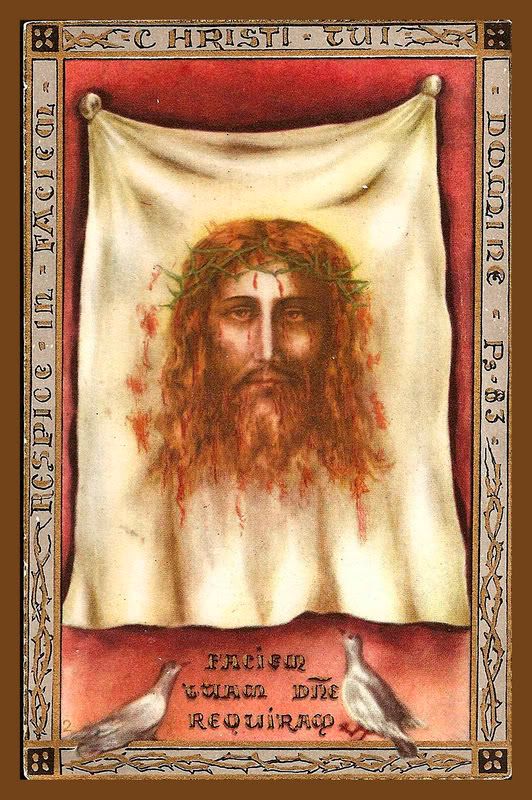
Devotions For A Lenten Thursday Holy Hour:
Dies Irae
Divine Mercy Chaplet
Seven Penitential Psalms
Prayer of St. Thomas More
Threnus Prayer of Saint Augustine
Devotion To the Holy Face

Devotions For A Lenten Thursday Holy Hour:
Dies Irae
Divine Mercy Chaplet
Seven Penitential Psalms
Prayer of St. Thomas More
Threnus Prayer of Saint Augustine
Devotion To the Holy Face
Labels: Restorationists
Wednesday, February 06, 2008
New Substitute Text For the Prayer For the Jewish People On Good Friday
Father Z has the details.
To me, it looks like nothing significant, since the new prayer says essentially the same thing as the old one, just without hot button language that many Jewish people would find offensive.
I can accept the change as perfectly legitimate. The Holy Father is perfectly free to make reforms of the Missal. Pope Pius XII did much the same thing, in a more comprehensive manner.
I don't particularly like change for the sake of change, and I especially don't care for kow-towing to noisy minorities. But what the Holy Father says, goes.
To me, it looks like nothing significant, since the new prayer says essentially the same thing as the old one, just without hot button language that many Jewish people would find offensive.
I can accept the change as perfectly legitimate. The Holy Father is perfectly free to make reforms of the Missal. Pope Pius XII did much the same thing, in a more comprehensive manner.
I don't particularly like change for the sake of change, and I especially don't care for kow-towing to noisy minorities. But what the Holy Father says, goes.
Labels: Restorationists
Super Tuesday Results
It looks like McCain is now the Republican nominee presumptive, after winning most of the primaries. For Huckabee or Romney to get back in at this point, to use the old southern expression, McCain would have to be found in bed with a dead girl, or a live boy.
It is still something of a fight between Hillary! and Obama. Look for Lucretia Borgia to outlast the Empty Suit, though it won't be easy, since she is about as popular as dentistry without anesthesia for most people who do not inhabit the liberal fever swamp.
It is still something of a fight between Hillary! and Obama. Look for Lucretia Borgia to outlast the Empty Suit, though it won't be easy, since she is about as popular as dentistry without anesthesia for most people who do not inhabit the liberal fever swamp.
Labels: American Patriotism Is Not A Sin
Ash Wednesday

Memento, homo, quia pulvis es, et in pulverem reverteris.
Remember, man, that thou art dust, and unto dust thou shalt return.
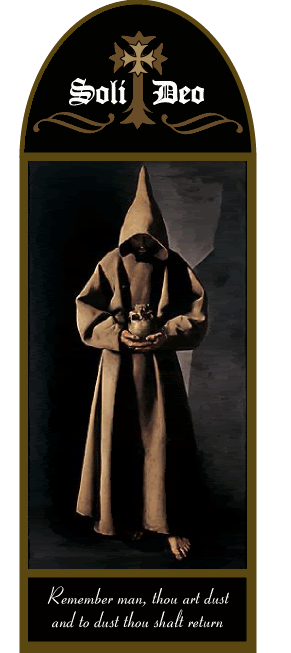
Carnival is over. Now the Lenten fast begins. It is an appropriately gloomy day here in Boston, with rain and heavy clouds.
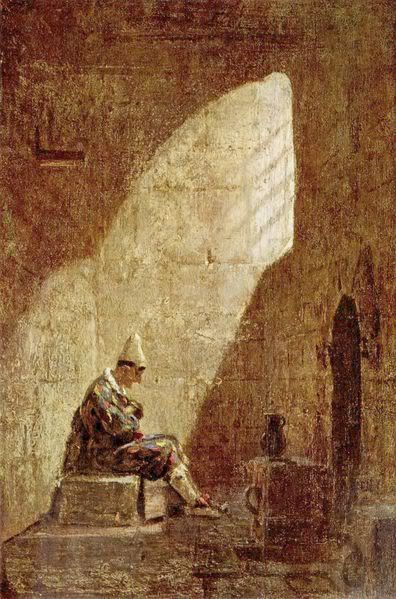
Station Church:
S. Sabina all'Aventino
Fish Eaters on Ash Wednesday
The Cornell Society For A Good Time on whether to display your ashes.
The Catholic Encyclopedia on Ash Wednesday.
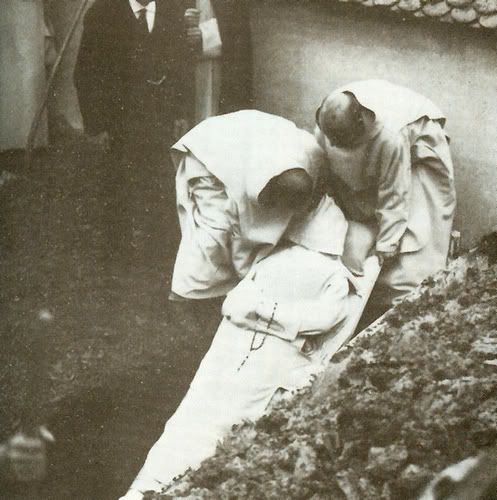

Devotions For a Lenten Wednesday Holy Hour:
Dies Irae
Divine Mercy Chaplet
Seven Penitential Psalms
Prayer of St. Thomas More
Threnus Prayer
Seven Prayers of St. Gregory
All of these prayers can be found at Recta Ratio: The Yahoo Group
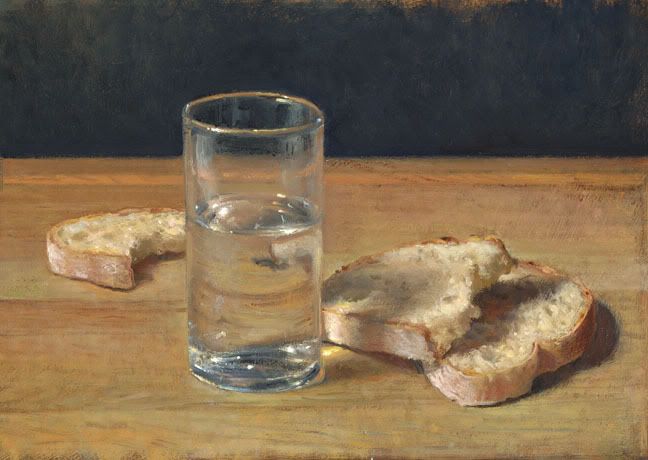
Labels: Restorationists
Tuesday, February 05, 2008
Shrove Tuesday or Mardi Gras
Fasting's Eve, Mardi Gras, Carnival, or Shrove Tuesday are names for this day before the beginning of Lent. The great fast of Lent begins tomorrow. Since pre-modern Europe observed what we would call a stringent fast (no meat, or dairy products from Ash Wednesday until Easter Sunday) the last day before the fast was a time for eating up meat, eggs, cheese, and drinking.
The names reflect that reality. The French "Mardi Gras" means "fat Tuesday." The Latin "Carne Vale" means "good-bye meat." The name "Shrove Tuesday" comes from the expectation that the pious would seek to be shriven (to confess) before undertaking the Lenten fast. "Fasting's Eve" is fairly clear.
Shrove Tuesday celebrations are continued to some extent in New Orleans' Mardi Gras, and Rio's Carnival. Drinking, feasting, and lewd behaviour were common.
But some Shrove Tuesday pastimes have passed away.
This used to be a great day for cockthreshing. A cock would be tethered to a pole, and selected participants would hurl stones at it in an effort to knock it down or kill it. It was also a good day for cockfighting, which continued to be popular into the 18th century. PETA-types would probably immolate themselves to stop that if it were common today (common, at least at the top of society: it is still widely, though secretly undertaken down at the lower levels).
Football games (we would call it soccer) were common on Shrove Tuesday in England. The difference was that in the 15th century, there were no teams and no rules. A football game was, therefore, a free-for-all. With the participants fueled by large amounts of alcohol and fresh meat, lots of people were injured. But it was all in good fun.
The Shrove Tuesday pancake is a slightly later tradition. The pancake requires milk, eggs, and butter, all of which had to be consumed before Lent started in that age before refrigeration. So the eating of pancakes became a Shrove Tuesday custom. Pancake races started at least 100 years before the Reformation. The Tossing of the Pancake at England's Westminister School is a natual development of the pancake tradition (a large pancake is tossed in part of the refectory, and the boy who comes out of a general scramble with the largest piece is given a reward).
Enjoy this last free day of Carnival. Tomorrow things take on a more sober cast.
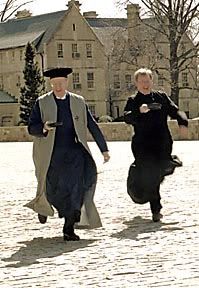
Shrove Tuesday Pancake Race. Those wild and wacky Anglicans! But wait, this is from the US National Cathedral website. Those wild ecumenical whatevers!
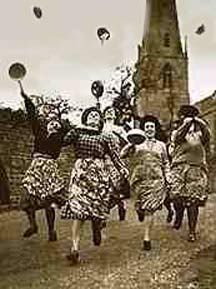
Here is a real Anglican Shrove Tuesday pancake race, from the UK.
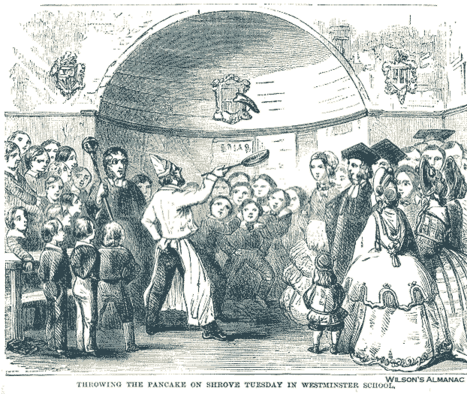
Throwing the Shrove Tuesday Pancake at Westminister School, London, 19th century. There was a scramble for it, as those who ended up with the pancake, or portions thereof if it was torn apart in the scrum, got a small cash prize.
More on Shrove Tuesday here at Wilson's Almanac.
And yet more, at Wikipedia.
But wait, there is even more Shrove Tuesday fun over at Fish Eaters.
How about a good pancake recipe?
Here's one from the files of Recta Ratio: The Yahoo Group (where there are over 500 recipes, many of them of seasonal interest, including many meatless meals for Lent):
2 eggs
1/2 c. whole milk
1/2 c. flour
2 T. brandy
2 T. butter
1 lime
Preheat oven to 400 degrees. Place an iron skillet in the oven and get it very hot. Beat eggs until fluffy. Add milk, brandy, and flour. Melt butter in the hot skillet, coating bottom and sides. Pour in the batter. Bake at 400 degrees for 30 mins (or until golden brown and puffy). Remove from oven and squeeze fresh lime juice over the pancake to deflate it. Dust with confectioners' sugar, maple syrup, and butter and serve immediately.

And what goes better with pancakes than

and lots of it? I dearly love my bacon, and the next six and a half weeks will be a sore trial going without it, or sausages, or corned beef hash, or....
The names reflect that reality. The French "Mardi Gras" means "fat Tuesday." The Latin "Carne Vale" means "good-bye meat." The name "Shrove Tuesday" comes from the expectation that the pious would seek to be shriven (to confess) before undertaking the Lenten fast. "Fasting's Eve" is fairly clear.
Shrove Tuesday celebrations are continued to some extent in New Orleans' Mardi Gras, and Rio's Carnival. Drinking, feasting, and lewd behaviour were common.
But some Shrove Tuesday pastimes have passed away.
This used to be a great day for cockthreshing. A cock would be tethered to a pole, and selected participants would hurl stones at it in an effort to knock it down or kill it. It was also a good day for cockfighting, which continued to be popular into the 18th century. PETA-types would probably immolate themselves to stop that if it were common today (common, at least at the top of society: it is still widely, though secretly undertaken down at the lower levels).
Football games (we would call it soccer) were common on Shrove Tuesday in England. The difference was that in the 15th century, there were no teams and no rules. A football game was, therefore, a free-for-all. With the participants fueled by large amounts of alcohol and fresh meat, lots of people were injured. But it was all in good fun.
The Shrove Tuesday pancake is a slightly later tradition. The pancake requires milk, eggs, and butter, all of which had to be consumed before Lent started in that age before refrigeration. So the eating of pancakes became a Shrove Tuesday custom. Pancake races started at least 100 years before the Reformation. The Tossing of the Pancake at England's Westminister School is a natual development of the pancake tradition (a large pancake is tossed in part of the refectory, and the boy who comes out of a general scramble with the largest piece is given a reward).
Enjoy this last free day of Carnival. Tomorrow things take on a more sober cast.

Shrove Tuesday Pancake Race. Those wild and wacky Anglicans! But wait, this is from the US National Cathedral website. Those wild ecumenical whatevers!

Here is a real Anglican Shrove Tuesday pancake race, from the UK.

Throwing the Shrove Tuesday Pancake at Westminister School, London, 19th century. There was a scramble for it, as those who ended up with the pancake, or portions thereof if it was torn apart in the scrum, got a small cash prize.
More on Shrove Tuesday here at Wilson's Almanac.
And yet more, at Wikipedia.
But wait, there is even more Shrove Tuesday fun over at Fish Eaters.
How about a good pancake recipe?
Here's one from the files of Recta Ratio: The Yahoo Group (where there are over 500 recipes, many of them of seasonal interest, including many meatless meals for Lent):
2 eggs
1/2 c. whole milk
1/2 c. flour
2 T. brandy
2 T. butter
1 lime
Preheat oven to 400 degrees. Place an iron skillet in the oven and get it very hot. Beat eggs until fluffy. Add milk, brandy, and flour. Melt butter in the hot skillet, coating bottom and sides. Pour in the batter. Bake at 400 degrees for 30 mins (or until golden brown and puffy). Remove from oven and squeeze fresh lime juice over the pancake to deflate it. Dust with confectioners' sugar, maple syrup, and butter and serve immediately.

And what goes better with pancakes than

and lots of it? I dearly love my bacon, and the next six and a half weeks will be a sore trial going without it, or sausages, or corned beef hash, or....
Labels: Restorationists
Lenten Resources At Recta Ratio The Yahoo Group
I try to add a few more resources to the Files every year to make Recta Ratio the Yahoo Group a more useful source for your Lenten preparations.
This year, I have added the text of
Father Frederick W. Faber's classic work on Our Blessed Lady's Sorrows, The Foot Of the Cross,
and Ven. Louis of Grenada's The Sinner's Guide.
In previous years, I have added the text of:
St. Robert Bellarmine's The Seven Words On the Cross,
St. Thomas More's On the Sadness of Christ
Meditations On the Hours Of The Passion Of Our Lord Jesus Christ,by Luisa Piccarreta,
The Lenten Litany,
The Passion Litany,
The Litany of Our Blessed Lady's Sorrows,
The Devotion of the Seven Last Words,
The Devotion of the Five Sacred Wounds,
The Devotion to the Holy Face,
The Seven Penitential Psalms (with the prayers against each of the Seven Deadly
Sins),
The Seven Prayers of Saint Gregory,
The Stabat Mater Dolorosa(both in English and Latin),
The Threnus Prayer of Saint Augustine,
The Prayer of St. Thomas More,
The Prayer Concerning the Wound In Our Lord's Shoulder,
The Prayer In Memory of the Scourging,
Prayers Before the Crucifix From the Raccolta,
The Fifteen Os of Saint Bridget,
A selection on the Corporal Passion by Dr. Pierre Barbet,
A Thirty-Day Prayer In Honor of the Passion, and other devotions a reflective material.
In addition, there is useful information like:
the text of the Office of Tenebrae for Holy Week,
the Lenten Stational Churches of Rome,
a selection on fasting by St. Gregory the Great,
the Improperia for Good Friday,
the medieval English classic, The Dream of the Rood,
The Way of the Cross according to the method of St. Alphonsus Liguori,
and a small selection of Lenten and Passiontide Hymns.
Eventually, Recta Ratio Yahoo Group will become your one-stop shopping destination
for traditional Catholic Lenten devotional material.
I hope it aids you in making this Lent a holy preparation for Our
Lord's Passion, Death, and Resurrection.
This year, I have added the text of
Father Frederick W. Faber's classic work on Our Blessed Lady's Sorrows, The Foot Of the Cross,
and Ven. Louis of Grenada's The Sinner's Guide.
In previous years, I have added the text of:
St. Robert Bellarmine's The Seven Words On the Cross,
St. Thomas More's On the Sadness of Christ
Meditations On the Hours Of The Passion Of Our Lord Jesus Christ,by Luisa Piccarreta,
The Lenten Litany,
The Passion Litany,
The Litany of Our Blessed Lady's Sorrows,
The Devotion of the Seven Last Words,
The Devotion of the Five Sacred Wounds,
The Devotion to the Holy Face,
The Seven Penitential Psalms (with the prayers against each of the Seven Deadly
Sins),
The Seven Prayers of Saint Gregory,
The Stabat Mater Dolorosa(both in English and Latin),
The Threnus Prayer of Saint Augustine,
The Prayer of St. Thomas More,
The Prayer Concerning the Wound In Our Lord's Shoulder,
The Prayer In Memory of the Scourging,
Prayers Before the Crucifix From the Raccolta,
The Fifteen Os of Saint Bridget,
A selection on the Corporal Passion by Dr. Pierre Barbet,
A Thirty-Day Prayer In Honor of the Passion, and other devotions a reflective material.
In addition, there is useful information like:
the text of the Office of Tenebrae for Holy Week,
the Lenten Stational Churches of Rome,
a selection on fasting by St. Gregory the Great,
the Improperia for Good Friday,
the medieval English classic, The Dream of the Rood,
The Way of the Cross according to the method of St. Alphonsus Liguori,
and a small selection of Lenten and Passiontide Hymns.
Eventually, Recta Ratio Yahoo Group will become your one-stop shopping destination
for traditional Catholic Lenten devotional material.
I hope it aids you in making this Lent a holy preparation for Our
Lord's Passion, Death, and Resurrection.
Labels: Restorationists
Monday, February 04, 2008
Plenary Indulgence For Our Lady Of Lourdes
We are in the midst of a Jubilee for the 150th Anniversary of the Apparitions of Our Lady in Lourdes, and the Church has provided a Plenary Indulgence for the faithful.
Each and every member of the Christian faithful who, truly repentant, is purified through sacramental confession, restored through the Most Holy Eucharist and offers prayers for the intentions of the Supreme Pontiff, will be able to gain a Plenary Indulgence daily, which may also be applied, by way of suffrage, to the souls of the faithful in Purgatory:
...
B) If, from the Feast of the Presentation of our Lord on 2 February 2008 until the end of the Memorial of the Blessed Virgin Mary of Lourdes on 11 February 2008, which is also the 150th Anniversary of the Apparition, they devoutly visit a blessed image of the Holy Virgin Mary of Lourdes in any church, chapel, grotto or other suitable place in which it is solemnly displayed, and in the presence of that image perform some pious act of Marian devotion, or at least pause to reflect for an appropriate length of time, concluding with the Lord's Prayer, some legitimate form of the Profession of Faith, and the Jubilee prayer or some other Marian invocation. (Apostolic Penitentiary)
Each and every member of the Christian faithful who, truly repentant, is purified through sacramental confession, restored through the Most Holy Eucharist and offers prayers for the intentions of the Supreme Pontiff, will be able to gain a Plenary Indulgence daily, which may also be applied, by way of suffrage, to the souls of the faithful in Purgatory:
...
B) If, from the Feast of the Presentation of our Lord on 2 February 2008 until the end of the Memorial of the Blessed Virgin Mary of Lourdes on 11 February 2008, which is also the 150th Anniversary of the Apparition, they devoutly visit a blessed image of the Holy Virgin Mary of Lourdes in any church, chapel, grotto or other suitable place in which it is solemnly displayed, and in the presence of that image perform some pious act of Marian devotion, or at least pause to reflect for an appropriate length of time, concluding with the Lord's Prayer, some legitimate form of the Profession of Faith, and the Jubilee prayer or some other Marian invocation. (Apostolic Penitentiary)
Labels: Restorationists
Collop Monday
Here we are, in the heart of Carnival, and today is a day historically devoted the the eating of collops (or chops) of meat. Get as much meat as you can now, since Ash Wednesday is looming. Beef, ham, pork, chicken, turkey; find it and devour it.
For traddies accept none of the Post-Conciliar, sissified, dumbed-down, "We-don't-want-to-make-it-too-hard-for-them," Friday-only abstention from meat. Lent itself is meatless, thoroughly meatless, from beginning to end. That is why this season is called Carnival, which is a contraction of the Latin "Carne Vale," or "good-bye, meat" (or "the flesh"). If our great-grandfathers could do it, so can we.
But if you are going to deprive yourself of meat for a very long time, and Ash Wednesday-through- Holy Saturday is quite a long time, you have to give it a good send-off. And that is why this season is here. Now is the time to make merry and pig out one last time, for starting on Ash Wednesday, we are fasting and abstaining.
But you say, "At least we have the Sundays"! No, not really. Sunday is never a fast day, true. But in a season of abstinence, while you can feast on the Sunday, you have to feast on non-meat items, since you are still abstaining.
Oh the list of things to be saying good-bye to! Gone will be gyros, and bacon-laden triple cheeseburgers, meatloaf, rashers of bacon, sausages, ham steaks, garlic roast beef, the Colonel's Strips, sirloin tips, chicken pasties, beef pasties, hot dogs, Beef Wellington, thick boneless center-cut pork chops, pork tenderloin roasts, pepperoni pizza, meatballs, tripe, pepperoni or sausage stromboli, Virginia Ham, chicken pot pie, sirloin, mushroom, and onion pie, turkey club sandwiches, ruebens, beef jerky, corned beef, pastrami, bologna sandwiches with Nathan's Coney island mustard on Miami Onion Rolls, hot Jamaican beef patties, chicken chowder, beef-based onion soup, cornish game hens, and even rabbit stew.
So many dear, much-loved mealtime companions!
Get ready for a lot of cheese and pasta, nuts and fruit and veggies (groan). Oh yeah, and there is peanut butter. Did I ever mention that most seafood I just won't touch? True. You get past mayo-laden tuna salad, some fried clams with no bellies, clam chowder, and maybe some shrimp with cocktail sauce, and I just won't go there. Even the de rigeur filet-o-fish with fries has well-defined limits.
Six and a half weeks of cheese pizza. Probably cold cheese pizza. And those little orange crackers with the peanut butter.
At least there are Cheez Waffies.
Tomorrow is Shrove Tuesday, or Pancake Tuesday. Can I have some meat on my pancakes?
In the meantime, pass me another Slim Jim, please.
For traddies accept none of the Post-Conciliar, sissified, dumbed-down, "We-don't-want-to-make-it-too-hard-for-them," Friday-only abstention from meat. Lent itself is meatless, thoroughly meatless, from beginning to end. That is why this season is called Carnival, which is a contraction of the Latin "Carne Vale," or "good-bye, meat" (or "the flesh"). If our great-grandfathers could do it, so can we.
But if you are going to deprive yourself of meat for a very long time, and Ash Wednesday-through- Holy Saturday is quite a long time, you have to give it a good send-off. And that is why this season is here. Now is the time to make merry and pig out one last time, for starting on Ash Wednesday, we are fasting and abstaining.
But you say, "At least we have the Sundays"! No, not really. Sunday is never a fast day, true. But in a season of abstinence, while you can feast on the Sunday, you have to feast on non-meat items, since you are still abstaining.
Oh the list of things to be saying good-bye to! Gone will be gyros, and bacon-laden triple cheeseburgers, meatloaf, rashers of bacon, sausages, ham steaks, garlic roast beef, the Colonel's Strips, sirloin tips, chicken pasties, beef pasties, hot dogs, Beef Wellington, thick boneless center-cut pork chops, pork tenderloin roasts, pepperoni pizza, meatballs, tripe, pepperoni or sausage stromboli, Virginia Ham, chicken pot pie, sirloin, mushroom, and onion pie, turkey club sandwiches, ruebens, beef jerky, corned beef, pastrami, bologna sandwiches with Nathan's Coney island mustard on Miami Onion Rolls, hot Jamaican beef patties, chicken chowder, beef-based onion soup, cornish game hens, and even rabbit stew.
So many dear, much-loved mealtime companions!
Get ready for a lot of cheese and pasta, nuts and fruit and veggies (groan). Oh yeah, and there is peanut butter. Did I ever mention that most seafood I just won't touch? True. You get past mayo-laden tuna salad, some fried clams with no bellies, clam chowder, and maybe some shrimp with cocktail sauce, and I just won't go there. Even the de rigeur filet-o-fish with fries has well-defined limits.
Six and a half weeks of cheese pizza. Probably cold cheese pizza. And those little orange crackers with the peanut butter.
At least there are Cheez Waffies.
Tomorrow is Shrove Tuesday, or Pancake Tuesday. Can I have some meat on my pancakes?
In the meantime, pass me another Slim Jim, please.
Labels: Restorationists
Oy Vey!
Well, I guess God wasn't willing.
The good news is that Defending World Champion Boston Red Sox Spring Training opens for pitchers and catchers on February 14th, just ten days away.
The good news is that Defending World Champion Boston Red Sox Spring Training opens for pitchers and catchers on February 14th, just ten days away.
Labels: Football Weekend Report
Sunday, February 03, 2008
Super Bowl Sunday
I must confess that I am not a football fan, per se. I don't follow the sport as a sport. I also am not a baseball fan, per se. But I do follow my local teams. And lately, our local teams have been blessed and crowned with frequent victories.
None more so than our football team, the New England Pariots. Once the laughingstock of the league, perpetual also-rans, looked down upon, sneered at by the football establishment, they have won 3 Super Bowls in the last 6 years.
Usually, the Super Bowl passes with a scarcely a notice from me. But not when my Patriots are in it!
Today, God willing, they will add a fourth Super Bowl victory by defeating the New York (football) Giants.
GO PATS!!!!!
None more so than our football team, the New England Pariots. Once the laughingstock of the league, perpetual also-rans, looked down upon, sneered at by the football establishment, they have won 3 Super Bowls in the last 6 years.
Usually, the Super Bowl passes with a scarcely a notice from me. But not when my Patriots are in it!
Today, God willing, they will add a fourth Super Bowl victory by defeating the New York (football) Giants.
GO PATS!!!!!
Labels: Football Weekend Report
Quinquagesima Sunday
Or Sunday in Shrovetide.
From The Liturgical Year, by Abbot Prosper Gueranger:
The Church gives us today another subject for our meditation: it is the vocation of Abraham. When the waters of the deluge had subsided, and mankind had once more peopled the earth, the immorality, which had previously excited God's anger, again grew rife among men. Idolatry, too, into which the antediluvian race had not fallen, now showed itself, and human wickedness seemed thus to have reached the height of its malice. Foreseeing that the nations of the earth would fall into rebellion against Him, God resolved to select one whom should be preserved those sacred truths, of which the Gentiles were to lose sight. This new people were to originate from one man, who would be the father and model of all future believers. This was Abraham. His faith and devotedness merited for him that he should be chosen to be the father of the children of God, and the head of that spiritual family, to which belong all the elect of both the old and the new Testament.
It is necessary, therefore, that we should know Abraham, our father and our model. This is his grand characteristic: fidelity to God, submissiveness to His commands, abandonment and sacrifice of everything in order to obey His holy will. Such ought to be the prominent virtues of every Christian. Let us, then, study the life of our great patriarch, and learn, the lessons it teaches in Genesis 12.
Could the Christian have a finer model than this holy patriarch, whose docility and devotedness in following the call of his God are so perfect? We are forced to exclaim, with the holy fathers: 'O true Christian, even before Christ had come on the earth! Was preached! He was an apostolic man before the apostles existed!' God calls him: he leaves all things-his country, his kindred, his father's house-and he goes into an unknown land. God leads him, he is satisfied; he fears no difficulties; he never once looks back. Did the apostles themselves more? But see how grand is his reward! God says to him: 'In thee shall all the kindred of the earth be blessed.' This Chaldean is to give to the world Him that shall bless and it. Death will, it is true, close his eyes ages before the dawning of that day, when one of his race, who is to be born of a Virgin And be united personally with the divine Word, shall redeem all generations, past, present, and to come. But meanwhile, till heaven shall be thrown open to receive this Redeemer and the countless just who have won the crown, Abraham shall be honored, in the limbo of expectation, in a manner becoming his great virtue and merit. It is in his bosom, (1)-{St. Luke xvi: 22} that is, around him, that our first parents (having atoned for their sin by penance), Noah, Moses, David, and all the just, including poor Lazarus, received that rest and happiness, which were a foretaste of, and a preparation for, eternal bliss in Heaven. Thus is Abraham honored; thus does God requite the love and fidelity of them that serve Him.
When the fullness of time came, the Son of God, who was also Son of Abraham, declared His eternal Father's power, by saying that He was about to raise up a new progeny of Abraham's children from the very stones, that is, from the Gentiles (1)-{St. Matthew iii: 9}. We Christians are this new generation. But are we worthy children of our father? Let us listen to the apostle of the Gentiles: 'By faith, Abraham, when called (by God), obeyed to go out into a place, which he was to receive for an inheritance: And he went out not knowing whither he went. By faith, he abode in the land, dwelling in tents, with Isaac and Jacob, the co-heirs of the same promise; for he looked for a city that hath foundations, whose builder and maker is God'(2)-{Heb. Xi. 8-10}.
If, therefore, we be children of Abraham, we must, as the Church tells us during Septuagesima, look upon ourselves as exiles on the earth, and dwell by hope and desire in that true country of ours, from which we are now banished, but towards which we are each day drawing nigher, if, like Abraham, we are faithful in the various stations allotted us by our Lord. We are commanded to use this world as though we need it not,(3)-{1 Corinthians vii: 31} to have an abiding conviction of our not having here a lasting city (4)-{Hebrews xiii: 14} and of the misery and danger we incur when we forget that death is one day to separate us from every thing we possess in this life.
How far from being true children of Abraham are those Christians who spend this and the two following days in intemperance and dissipation, because Lent is soon to be upon us! We can easily understand how the simple manners of our Catholic forefathers could keep a leave-taking of the ordinary way of living, which Lent was to interrupt, and reconcile their innocent carnival with Christian gravity; just as we can understand how their rigorous observance of the laws of the Church for Lent would inspire certain festive customs at Easter. Even in our own times, a joyous Shrovetide is not to be altogether reprobated, provided the Christian sentiment of the approaching holy season of Lent be strong enough to check the evil tendency of an innocent custom would be perverted, and the forethought of penance could in no sense be considered as the prompter of our joyous farewell to ease and comforts.
While admitting all this, we would ask, what right or title have they to share in these Shrovetide rejoicings, whose Lent will pass and find them out of the Church, because they will not have complied with the precept of Easter Communion? And they, too, who claim dispensations from abstinence and fasting during Lent, and, for one reason or another, evade every penitential exercise during the solemn forty days of penance, And will find themselves at Easter as weighed down by the guilt and debt of their sins as they were on Ash Wednesday - what meaning, we would ask, can there possibly be in their feast-making at Shrovetide?
Oh! That Christians would stand on their guard against such delusions as these, and gain that holy liberty of children of God,(1)-{Romans viii: 21} which consists in not being slaves to flesh and blood, and preserves man from moral degradation! Let them remember that we are now in that holy season, when the Church denies herself her songs of holy joy, in order the more forcibly to remind us that we are living in a Babylon of spiritual danger, and to excite us to regain that genuine Christian spirit, which everything in the world around us is quietly undermining. If the disciples of Christ are necessitated, by the position they hold in society, to take part in the profane amusements of these few days before Lent, let it be with a heart deeply imbued with the maxims of the Gospel. If, for example, they are obliged to listen to the music of theatres and concerts, let them imitate St. Cecilia, who thus sang, in her heart, in the midst of the excitement of worldly harmonies; 'May my heart, O God, be pure, and let me not be confounded!' Above all, let them not countenance certain dances, which the world is so eloquent in defending, because so evidently according to its own spirit; and therefore they who encourage they will be severely judged by Him, who has already pronounced woe upon the world. Lastly, let those who must go, on these days, and mingle in the company of worldlings, be guided by St. Francis of Sales, who advises them to think, from time to time, on such considerations as these: that while all these frivolous, and often dangerous, amusements are going on, there are countless souls being tormented in the fire of hell, on account of the sins they committed on similar occasions; that, at that very hour of the night, there are many holy religious depriving themselves of sleep in order to sing the divine praises and implore God's mercy upon the world, and upon them that are wasting their time in its vanities; that there are thousands in the agonies of death, while all that gaiety is going on; that God and His angels are attentively looking upon this thoughtless group and finally, that life is passing away, and death so much nearer each moment(1)-{Introduction to a Devout Life,' part iii. Chapter xxiii}.
We grant that, on these three days immediately preceding the penitential season of Lent, some provision was necessary to be made for those countless souls, who seem scarce able to live without some excitement. The Church supplies this want. She gives a substitute for frivolous amusements and dangerous pleasures; and those of her children upon whom faith has not lost its influence, will find, in what she offers them, a feast surpassing all earthly enjoyments, and a means whereby to make amends to God for the insults offered to His divine Majesty during these days of carnival. The Lamb, that taketh away the sins of the world, is exposed upon our altars. Here, on this His throne of mercy, He receives the homage of them who come to adore Him, and acknowledge Him for their King; He accepts the repentance of those who come to tell Him how grieved they are at having ever followed any other master but Him; He offers Himself to His eternal Father for poor sinners, who not only treat His favors with indifference, but seem to have made a resolution to offend Him during these days more than at any other period of the year.
It was the pious Cardinal Gabriel Paleotti, archbishop of Bologna, who first originated the admirable devotion of the Forty Hours. He was a contemporary of St. Charles Borromeo, and, like him, was eminent for his pastoral ZEAL. His object in this solemn Exposition of the most blessed Sacrament was to offer to the divine Majesty some compensation for the sins of men, and, at the very time when the world was busiest in deserving His anger, to appease it by the sight of His own Son, the Mediator between heaven and earth. St. Charles immediately introduced the devotion into his own diocese and province. This was in the sixteenth century. Later on, that is, in the eighteenth century, Prosper Lambertini was archbishop of Bologna; he zealously continued the pious design of his ancient predecessor, Paleotti, by encouraging his flock to devotion towards the blessed Sacrament during the three days of carnival; and when he was made Pope, under the name of Benedict XIV, he granted many Indulgences to all who, during these days, should visit our Lord in this mystery of His love, and should pray for the pardon of sinners. This favor was, at first, restricted to the faithful of the Papal States; but in the year 1765 it was extended, by Pope Clement XIII, to the universal Church. Thus, the Forty Hours' Devotion has spread throughout the whole world, and become one of the most solemn expressions of Catholic piety. Let us, then, who have the opportunity, profit by it during these last three days of our preparation for Lent. Let us, like Abraham, retire from the distracting dangers of the world, and seek the Lord our God. Let us go apart, for at least one short hour, from the dissipation of earthly enjoyments, and, kneeling in the presence of our Jesus, merit the grace to keep our hearts innocent and detached, whilst sharing in those we cannot avoid.
From The Liturgical Year, by Abbot Prosper Gueranger:
The Church gives us today another subject for our meditation: it is the vocation of Abraham. When the waters of the deluge had subsided, and mankind had once more peopled the earth, the immorality, which had previously excited God's anger, again grew rife among men. Idolatry, too, into which the antediluvian race had not fallen, now showed itself, and human wickedness seemed thus to have reached the height of its malice. Foreseeing that the nations of the earth would fall into rebellion against Him, God resolved to select one whom should be preserved those sacred truths, of which the Gentiles were to lose sight. This new people were to originate from one man, who would be the father and model of all future believers. This was Abraham. His faith and devotedness merited for him that he should be chosen to be the father of the children of God, and the head of that spiritual family, to which belong all the elect of both the old and the new Testament.
It is necessary, therefore, that we should know Abraham, our father and our model. This is his grand characteristic: fidelity to God, submissiveness to His commands, abandonment and sacrifice of everything in order to obey His holy will. Such ought to be the prominent virtues of every Christian. Let us, then, study the life of our great patriarch, and learn, the lessons it teaches in Genesis 12.
Could the Christian have a finer model than this holy patriarch, whose docility and devotedness in following the call of his God are so perfect? We are forced to exclaim, with the holy fathers: 'O true Christian, even before Christ had come on the earth! Was preached! He was an apostolic man before the apostles existed!' God calls him: he leaves all things-his country, his kindred, his father's house-and he goes into an unknown land. God leads him, he is satisfied; he fears no difficulties; he never once looks back. Did the apostles themselves more? But see how grand is his reward! God says to him: 'In thee shall all the kindred of the earth be blessed.' This Chaldean is to give to the world Him that shall bless and it. Death will, it is true, close his eyes ages before the dawning of that day, when one of his race, who is to be born of a Virgin And be united personally with the divine Word, shall redeem all generations, past, present, and to come. But meanwhile, till heaven shall be thrown open to receive this Redeemer and the countless just who have won the crown, Abraham shall be honored, in the limbo of expectation, in a manner becoming his great virtue and merit. It is in his bosom, (1)-{St. Luke xvi: 22} that is, around him, that our first parents (having atoned for their sin by penance), Noah, Moses, David, and all the just, including poor Lazarus, received that rest and happiness, which were a foretaste of, and a preparation for, eternal bliss in Heaven. Thus is Abraham honored; thus does God requite the love and fidelity of them that serve Him.
When the fullness of time came, the Son of God, who was also Son of Abraham, declared His eternal Father's power, by saying that He was about to raise up a new progeny of Abraham's children from the very stones, that is, from the Gentiles (1)-{St. Matthew iii: 9}. We Christians are this new generation. But are we worthy children of our father? Let us listen to the apostle of the Gentiles: 'By faith, Abraham, when called (by God), obeyed to go out into a place, which he was to receive for an inheritance: And he went out not knowing whither he went. By faith, he abode in the land, dwelling in tents, with Isaac and Jacob, the co-heirs of the same promise; for he looked for a city that hath foundations, whose builder and maker is God'(2)-{Heb. Xi. 8-10}.
If, therefore, we be children of Abraham, we must, as the Church tells us during Septuagesima, look upon ourselves as exiles on the earth, and dwell by hope and desire in that true country of ours, from which we are now banished, but towards which we are each day drawing nigher, if, like Abraham, we are faithful in the various stations allotted us by our Lord. We are commanded to use this world as though we need it not,(3)-{1 Corinthians vii: 31} to have an abiding conviction of our not having here a lasting city (4)-{Hebrews xiii: 14} and of the misery and danger we incur when we forget that death is one day to separate us from every thing we possess in this life.
How far from being true children of Abraham are those Christians who spend this and the two following days in intemperance and dissipation, because Lent is soon to be upon us! We can easily understand how the simple manners of our Catholic forefathers could keep a leave-taking of the ordinary way of living, which Lent was to interrupt, and reconcile their innocent carnival with Christian gravity; just as we can understand how their rigorous observance of the laws of the Church for Lent would inspire certain festive customs at Easter. Even in our own times, a joyous Shrovetide is not to be altogether reprobated, provided the Christian sentiment of the approaching holy season of Lent be strong enough to check the evil tendency of an innocent custom would be perverted, and the forethought of penance could in no sense be considered as the prompter of our joyous farewell to ease and comforts.
While admitting all this, we would ask, what right or title have they to share in these Shrovetide rejoicings, whose Lent will pass and find them out of the Church, because they will not have complied with the precept of Easter Communion? And they, too, who claim dispensations from abstinence and fasting during Lent, and, for one reason or another, evade every penitential exercise during the solemn forty days of penance, And will find themselves at Easter as weighed down by the guilt and debt of their sins as they were on Ash Wednesday - what meaning, we would ask, can there possibly be in their feast-making at Shrovetide?
Oh! That Christians would stand on their guard against such delusions as these, and gain that holy liberty of children of God,(1)-{Romans viii: 21} which consists in not being slaves to flesh and blood, and preserves man from moral degradation! Let them remember that we are now in that holy season, when the Church denies herself her songs of holy joy, in order the more forcibly to remind us that we are living in a Babylon of spiritual danger, and to excite us to regain that genuine Christian spirit, which everything in the world around us is quietly undermining. If the disciples of Christ are necessitated, by the position they hold in society, to take part in the profane amusements of these few days before Lent, let it be with a heart deeply imbued with the maxims of the Gospel. If, for example, they are obliged to listen to the music of theatres and concerts, let them imitate St. Cecilia, who thus sang, in her heart, in the midst of the excitement of worldly harmonies; 'May my heart, O God, be pure, and let me not be confounded!' Above all, let them not countenance certain dances, which the world is so eloquent in defending, because so evidently according to its own spirit; and therefore they who encourage they will be severely judged by Him, who has already pronounced woe upon the world. Lastly, let those who must go, on these days, and mingle in the company of worldlings, be guided by St. Francis of Sales, who advises them to think, from time to time, on such considerations as these: that while all these frivolous, and often dangerous, amusements are going on, there are countless souls being tormented in the fire of hell, on account of the sins they committed on similar occasions; that, at that very hour of the night, there are many holy religious depriving themselves of sleep in order to sing the divine praises and implore God's mercy upon the world, and upon them that are wasting their time in its vanities; that there are thousands in the agonies of death, while all that gaiety is going on; that God and His angels are attentively looking upon this thoughtless group and finally, that life is passing away, and death so much nearer each moment(1)-{Introduction to a Devout Life,' part iii. Chapter xxiii}.
We grant that, on these three days immediately preceding the penitential season of Lent, some provision was necessary to be made for those countless souls, who seem scarce able to live without some excitement. The Church supplies this want. She gives a substitute for frivolous amusements and dangerous pleasures; and those of her children upon whom faith has not lost its influence, will find, in what she offers them, a feast surpassing all earthly enjoyments, and a means whereby to make amends to God for the insults offered to His divine Majesty during these days of carnival. The Lamb, that taketh away the sins of the world, is exposed upon our altars. Here, on this His throne of mercy, He receives the homage of them who come to adore Him, and acknowledge Him for their King; He accepts the repentance of those who come to tell Him how grieved they are at having ever followed any other master but Him; He offers Himself to His eternal Father for poor sinners, who not only treat His favors with indifference, but seem to have made a resolution to offend Him during these days more than at any other period of the year.
It was the pious Cardinal Gabriel Paleotti, archbishop of Bologna, who first originated the admirable devotion of the Forty Hours. He was a contemporary of St. Charles Borromeo, and, like him, was eminent for his pastoral ZEAL. His object in this solemn Exposition of the most blessed Sacrament was to offer to the divine Majesty some compensation for the sins of men, and, at the very time when the world was busiest in deserving His anger, to appease it by the sight of His own Son, the Mediator between heaven and earth. St. Charles immediately introduced the devotion into his own diocese and province. This was in the sixteenth century. Later on, that is, in the eighteenth century, Prosper Lambertini was archbishop of Bologna; he zealously continued the pious design of his ancient predecessor, Paleotti, by encouraging his flock to devotion towards the blessed Sacrament during the three days of carnival; and when he was made Pope, under the name of Benedict XIV, he granted many Indulgences to all who, during these days, should visit our Lord in this mystery of His love, and should pray for the pardon of sinners. This favor was, at first, restricted to the faithful of the Papal States; but in the year 1765 it was extended, by Pope Clement XIII, to the universal Church. Thus, the Forty Hours' Devotion has spread throughout the whole world, and become one of the most solemn expressions of Catholic piety. Let us, then, who have the opportunity, profit by it during these last three days of our preparation for Lent. Let us, like Abraham, retire from the distracting dangers of the world, and seek the Lord our God. Let us go apart, for at least one short hour, from the dissipation of earthly enjoyments, and, kneeling in the presence of our Jesus, merit the grace to keep our hearts innocent and detached, whilst sharing in those we cannot avoid.
Labels: Restorationists
St. Blaise
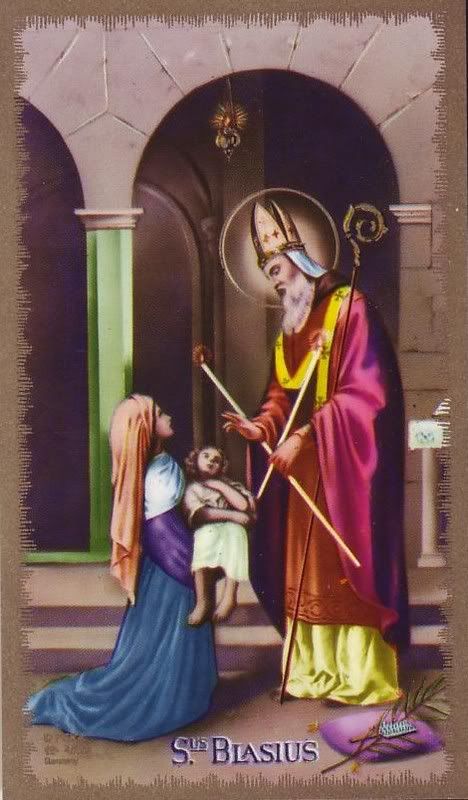
If today were not a Sunday, it would be the feast of Saint Blaise.
Here is what The Golden Legend has to say about St. Blaise, whose patronage is particularly efficacious for those suffering from disorders of the throat. I have a little tickle in the back of my own throat even now.
St. Blaise, pl;ease pray for us!
Labels: Restorationists






































































































